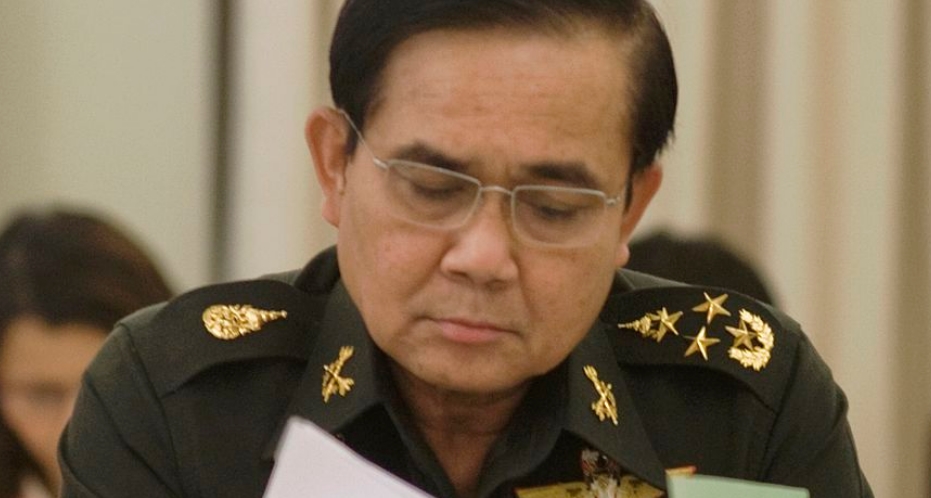Driving commercial and political engagement between Asia, the Middle East and Europe
Driving commercial and political engagement between Asia, the Middle East and Europe
Driving commercial and political engagement between Asia, the Middle East and Europe

The referendum on the introduction of Thailand’s 20th Constitution passed without serious incident on 7 August 2016, giving the government backed ‘Yes’ vote a 61.45 per cent victory on a voter turnout of 58 per cent.
The new constitution will pave the way for general elections in 2017, but more controversially, dictates that the new Senate, or upper house, within the Thai parliament will be made up entirely of officials appointed by the military, effectively providing the military with a veto over decisions made by any future democratically-elected government.
Six seats within the 250 seat Senate will be reserved for key military and security officials. In addition, a new system of proportional representation, Mixed Member Apportionment (MMA) will be introduced, making it harder for any political party to win an overall majority, whilst favouring medium sized parties, and finally, greater powers of impeachment have been granted to the judiciary.
Leading politicians from both major political parties, Pheu Thai and the Democrats, were against the proposed constitutional reform, but restrictions in advance of the referendum effectively silenced any criticism or opposition before the vote. Both major parties have declared that they accept the result.
It’s hard to say exactly why Thailand appears to have voted for what appears to be in effect ‘less democracy’, but there are probably a number of motivations at play. Firstly, it’s reasonable for the Thai people to be desperate for a return to some kind of normality, and a tightly-controlled democracy may appear more appealing than none at all. A ‘No’ vote would have further delayed general elections, and may have been destabilising politically.
Secondly, it is quite likely that the lack of open debate had a positive effect on the ‘Yes’ vote. And finally, as with other parts of the world, there is certainly a frustration and weariness with professional politicians of all hues, and constant allegations of corruption. The vote could well be viewed as partially a vote of no confidence in the political class.
Predictably, the spread of voting across the country took on a very similar demographic to the voting in previous general elections; the ‘No’ vote largely aligned with Pheu Thai areas in the north, north-east and deep south, with the ‘Yes’ vote, largely following the Democrat Party demographic aligned to Bangkok and the south. This adds credibility to the views of a number of commentators who had suggested that the referendum was as much a vote on the leadership of the junta leader General Prayuth Chan-o-cha, as it was on the restructuring of the constitution.
General Prayuth will be aware of this, the result of which now, on one view, arguably, gives him the right to claim government legitimacy. This will make a tough government line against oppositionists and dissenters more likely in the run up to the 2017 general election.
The short term positives
That Thailand, at last, has a roadmap can be viewed as positive news for the country. In the short to medium term, the vote will allow the junta to focus on the next chapter and work towards the 2017 general election, safe in the knowledge that it will retain a large element of control. Stability is good for investment, and in this respect, the decisive ‘Yes’ vote is likely to be positive for the immediate economic outlook for the country.
Thailand is in dire need of foreign investment. Free Trade Agreement negotiations between the EU and Thailand came to a halt in February 2016. During the negotiations, the EU stated that there was “zero chance” of agreement during military rule. According to the media, since the 22 May 2014 coup, EU investment has dropped from 6.7 billion baht in 2014 to 2 billion baht in 2015.
Further, figures in early 2016 also suggest that Japanese investment in Thailand had plummeted since the coup. Japan has historically been the most important investment partner in Thailand, with many Japanese corporates basing their Southeast Asian hubs in Bangkok, rather than Hong Kong or Singapore. Investment from both America and China has also reduced.
The Thai government has argued that the drop in Foreign Direct Investments is not a result of the coup, but is instead the result of a change in Thailand’s policy to reshape itself into a highly skilled export economy. However, it seems likely that at least some of the drop in FDI is connected to instability, political uncertainty and foreign political opposition to the concept of military rule.
Assuming that Prayuth follows through on his promise, the referendum result may help provide comfort to foreign investors that Thailand is finally back on the path towards democracy in some form.
The longer term uncertainties
However, the underlying narrative within Thailand is one of a newly industrialised nation moving from a historic era of limited privilege and elite control, into a globally outwards looking, progressive, regional hub with broad democratic representation, better access to wealth, education and healthcare and the higher expectations that come with that. Within this context, it is worth remembering a number of key factors.
Firstly, the Thai economy is largely export-driven and still heavily reliant on agriculture and mass produced goods. Thailand’s exports have been hit hard by the slowing down of China.
Thai central bankers and politicians have remained unwilling to devalue the baht in order to give exports a much-needed shot in the arm.
Thailand’s regional neighbours have, instead, reaped the benefit of lower wages and work forces with lower expectations.
Although the Thai government has declared its intention to reshape the economy into a technologically-advanced export economy, this has yet to happen in any meaningful way.
This is a creditable ambition; but to achieve this, education has to be a top priority, and there has been no indication of the military government promoting critical thinking, or encouraging innovation and entrepreneurism to lead the next generation and to provide the highly skilled workforce this future vision will require.
Secondly, the pro-Thaksin Shinawatra politically aligned parties, currently represented by Pheu Thai, have won the last four national elections in February 2001, February 2005, December 2007, and July 2011 when Thaksin’s sister, Yingluk won in a landslide after a period of judicially appointed Democrat government.
Pheu Thai also won the most recent election in February 2014, but which was subsequently judged to be void, and which was quickly followed by the military coup in May 2014.
There remains a strong chance, therefore, that Pheu Thai, or another renamed, but Thaksin backed and supported political party would once again win the largest number of votes in the election in 2017.
However, by introducing Mixed Member Apportionment proportional representation , the new constitution will make it harder for a single party to win an overall majority. This will increase the risk of political deadlock creating the possibility of new smaller parties working in concert against a larger party.
Should a pro-Thaksin aligned party win an indisputable outright election victory, this could set the country up for the possibility of more political deadlock, should that party try to legislate against the will of the military controlled Senate.
Thirdly, Thailand has been tied up with its own domestic turmoil, as the region around it is quickly changing.
Myanmar is going through a period of political upheaval and re-focus, which could well lead to it becoming a preferred or alternative investment destination and regional hub over Thailand.
The country is resource rich, with an inexpensive workforce and a population with generally good English skills.
Myanmar is also geographically strategically important, with access to the Bay of Bengal, India and the West, and numerous opportunities to develop new infrastructure to become a new gateway for the whole of Asia.
In the other direction, Vietnam – having signed the Trans-Pacific Partnership (TPP), and with a new government in place, is rapidly challenging Thailand as – at least in America’s eyes – America’s preferred regional partner and hub of soft power in Southeast Asia.
Whilst the Americans were openly critical of Thailand’s military coup, and subsequent tightening of civil liberties, which led to a public spat with the US ambassador, Obama was keen to pay a state visit to the new Vietnamese government before leaving office.
Finally – with exports and investment both suffering, the last thing the Thai government can afford is a dent in the tourism sector, which is increasingly important.
However, for the first time, tourists appear to have been targeted during the terrorist attacks on 12 August 2016. Although not certain, it looks likely that the southern insurgent group BRN was responsible for this attack and it is yet to be seen if this is the beginning of a new phase of violence in the South. The new constitution, therefore, will also need to create an environment to allow government to be inclusive and to allow and encourage debate between sides where tensions currently exist. The appointed senators will need to be alert to the dangers of not allowing free debate.
Thailand has to address all of these structural and political challenges, keeping itself relevant in a globalised world, whilst maintaining the internal stability to increase growth, in order to continue its position as an Asian leader. It is not immediately clear how the referendum will help create the environment for future governments to address these challenges in the long term; but any measure which helps the country return to some kind of normality and stability, will likely improve investor confidence at least in the short term.

Richard Dailly is Managing Director, Southeast Asia, Kroll. Kroll is the leading global provider of risk solutions. For more than 40 years, Kroll has helped clients make confident risk management decisions about people, assets, operations, and security through a wide range of investigations, cyber security, due diligence and compliance, physical and operational security, and data and information management services. To contact Mr Dailly click here.
On Tuesday 6 September the Hon Steven Ciobo MP, Australian Minister for Trade, Tourism and Investment, will speak exclusively at Asia House on the outlook for UK trade relations with Australia in particular, and Asia in general following the Brexit vote earlier this year. This will be his only public speaking engagement during his official visit to the UK. For more information click here or email conor.paterson@asiahouse.co.uk.
On Friday 16 September experts and senior business figures will gather to discuss ASEAN’s future potential as a major global player. This signature conference, in partnership with KPMG, will draw on insights from KPMG’s recently published ‘Southeast Asia in transition’ report. For more information click here or email conor.paterson@asiahouse.co.uk.
To find out more about corporate services that Asia House offers click here or email Charlie.Humphreys@asiahouse.co.uk
